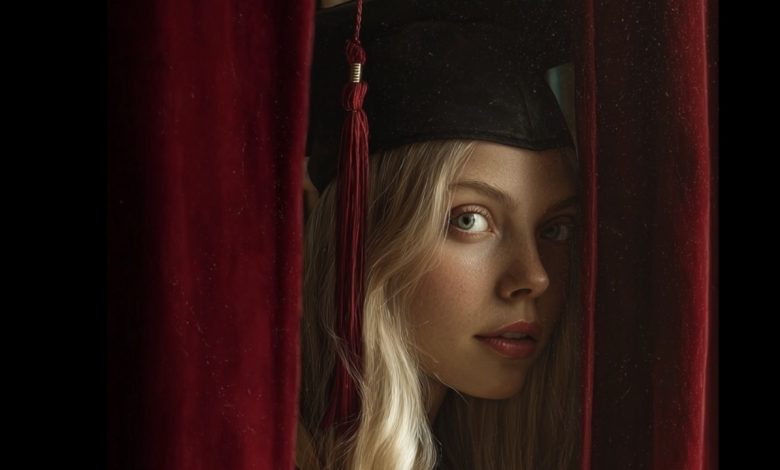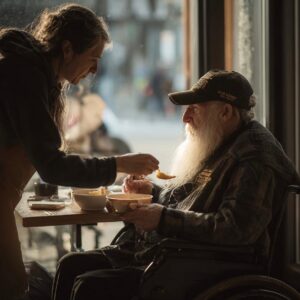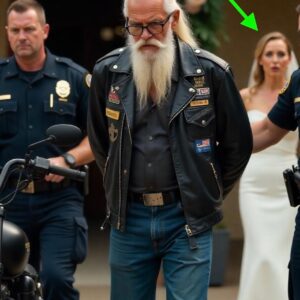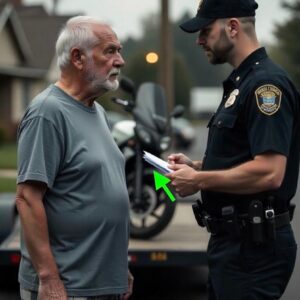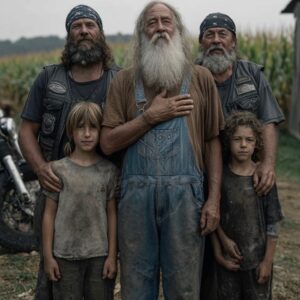Then, out of the corner of my eye, I spotted Ava. She had slipped from her assigned spot several people down and worked her way until she was standing directly behind me. My pulse stuttered. She leaned in, her face close to mine, and whispered in a calm, cold voice: “Remember when I said I’d ruin your life? Today’s the day.”
I froze. My breath hitched in my throat. My mind raced: What was she planning? I tried to look at her, to figure out what she meant, but before I could even turn fully, it happened. As I took the first step forward toward the stage, Ava reached out one slim foot and hooked it behind my heel. I pitched forward, off balance, and crashed onto the polished wooden floor.
Gasps rose from the crowd like a wave. My cap flew off, my tassel snapping free, and I landed with a heavy thud that echoed through the silent gym. My gown bunched around me, and for a moment I lay there, stunned and dazed. The bright stage lights felt like hot suns spinning overhead. I could see my parents leaning forward in the front row, their faces twisted in shock and concern.
I tried to push myself up, my knees scraping against the wood, my palms bruised and raw. Suddenly, a hand reached down—our principal, looking stunned. He helped me to my feet and whispered, “Are you okay?” I whispered back, voice shaking, “I’m fine,” though my heart felt shattered. Then, scarcely believing what had happened, I realized the entire moment was frozen in everyone’s mind: the promise I made to myself, the years of silent effort, all undone by one cruel trick.
And then—just like that—she did it. In front of everyone
I lay there for a moment, stunned, as the entire gym echoed with gasps. My cap had rolled across the stage, and my gown felt heavy and tangled. I could see my parents’ faces in the front row—Mom’s hand over her mouth, Dad rising to his feet, eyes wide with shock and anger. The principal rushed over, helped me up, and whispered, “Take a deep breath. You’re okay.”
I straightened my gown and smoothed my hair, blinking back tears of embarrassment. My diploma was already in his hand, and he waited politely for me to continue. I took a steadying breath, glanced at the audience, and stepped forward again. With my heart pounding, I accepted the diploma and lifted it high—proof that Ava’s final trick hadn’t stolen my moment. A wave of applause rose, louder than before, and I heard my name called again, this time in genuine cheer.
Later that afternoon, after the ceremony, word of the incident spread quickly. What nobody knew at the time was that two small cameras had been set up to livestream the event—one at each end of the stage. Those cameras captured every second: Ava shifting her spot in line, her whispered threat, and the precise moment her foot hooked behind mine. The video was uploaded to the school’s private Facebook page along with the rest of the graduation footage.
Within hours, classmates, parents, and teachers were watching in slow motion. Comments poured in: “Did you see Ava’s grin?” “She tripped her on purpose!” “That was cold-hearted.” Even the school board took notice. By the next morning, Ava’s cruel act was no longer a hushed rumor but a clear, undeniable fact.
My parents called a family meeting that evening. Mom’s eyes were red from tears, and Dad spoke with unusual firmness. He turned to Ava and said, “We love you both, but what you did was wrong. You deliberately humiliated your sister in front of everyone.” Ava’s face flushed, and she dug her nails into her palms.
The school disciplined her: her Student of the Year nomination was withdrawn, and she was placed on probation for bullying. A local journalism club, which had been considering her for an award, rescinded their offer as well. Even the principal, who had once dismissed our childhood clashes as harmless sibling rivalry, apologized to me publicly and promised stricter measures against harassment.
Ava didn’t speak to me for weeks. When she finally came to my room, voice trembling, she managed, “I’m sorry.” I remembered that first night, eight years ago, when she vowed revenge. But staring at her now, I saw something new in her eyes—shame and regret alongside the old anger.
I took a slow breath and said, “I forgive you.” It wasn’t easy to mean it, but I wanted to break the cycle. I told her, “You’re my sister. We’ll move past this.” She nodded, tears slipping down her cheeks.
That fall, I left for college with a packed car, a full scholarship, and a heart finally free of that old, heavy fear. Before I walked through my dorm door, I called home. Mom answered, her voice bright, and I said, “Everything’s okay. I’m ready.”
Ava visited me the next holiday. At breakfast, she slipped across the table and quietly passed me a small box. Inside was a silver charm shaped like a graduation cap. “For your new beginnings,” she said softly.
I smiled and clipped it onto my necklace. In that moment, I knew we had both finally grown up. The worst day of my life opened the door to something better: a sister who chose to build me up instead of tear me down—and a future I could step into with my head held high.
